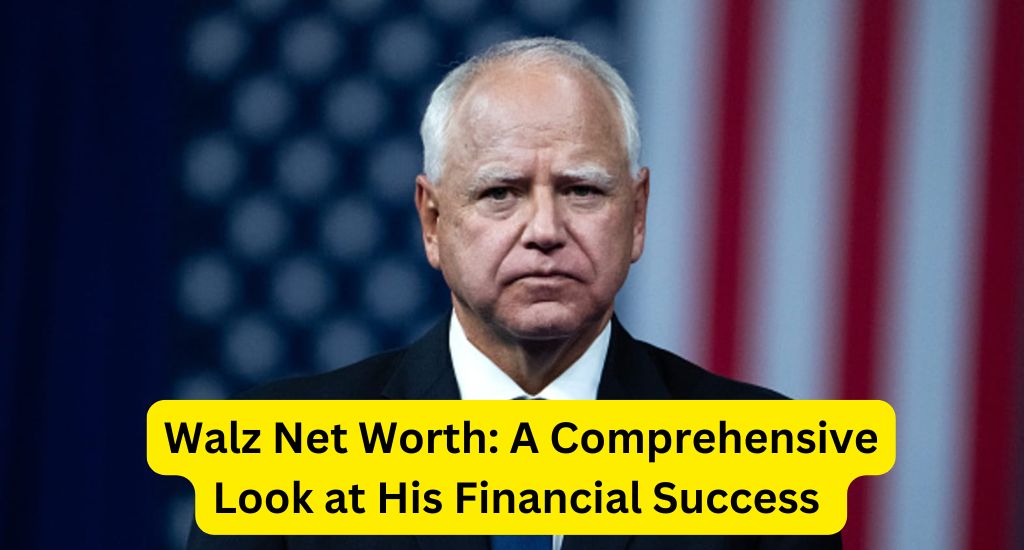Walz Net Worth: A Comprehensive Look at His Financial Success

In the world of politics, Tim Walz stands out not only for his contributions to public service but also for his financial acumen. As the 41st Governor of Minnesota, Tim Walz has garnered attention not just for his political strategies but for the growth in his net worth over the years. In this article, we dive deep into Walz’s net worth, examining his income sources, investments, and how his wealth has evolved over time.
Early Life and Career Foundations
Tim Walz was born on April 6, 1964, in West Point, Nebraska. Before venturing into politics, he pursued a career in education, serving as a high school teacher. His early years were marked by dedication to his community, which laid the foundation for his later political career. However, it wasn’t until he entered the political arena that his financial journey truly began to take shape.
Walz Net Worth: Political Career and Salary
Tim Walz’s political career began in earnest when he was elected to the U.S. House of Representatives in 2006, representing Minnesota’s 1st congressional district. During his tenure in Congress, Walz earned a base salary that contributed significantly to his net worth. As a congressman, his annual salary was approximately $174,000, which, while substantial, is relatively modest compared to many private sector incomes.
However, his role as Governor of Minnesota has had a more considerable impact on his earnings. The governor’s salary in Minnesota is set at around $127,629 per year, although this figure can vary slightly depending on specific budget allocations and adjustments. This steady income, coupled with the benefits that come with being a public official, has played a crucial role in the accumulation of Walz’s net worth.
Investment Portfolio and Financial Growth
One of the key aspects of Tim Walz’s financial success is his strategic investments. While detailed information about his investment portfolio is not publicly disclosed, it is common for public figures like Walz to diversify their assets across various sectors. Real estate, stocks, and bonds are typical components of a balanced portfolio, and it is likely that Walz has made prudent investments in these areas.
Real estate, in particular, is a common avenue for wealth accumulation among politicians. Properties often appreciate over time, providing a stable and growing source of wealth. It’s plausible that Walz has invested in both residential and commercial properties, leveraging his political insight and connections to make informed decisions.
Additionally, like many public figures, Walz may have investments in the stock market. Stocks provide the opportunity for significant returns, especially when managed by financial experts. Bonds, on the other hand, offer a safer, though typically lower-yield, investment option. Together, these investments contribute to the stability and growth of Walz’s net worth.
Book Deals and Public Speaking Engagements
Another significant source of income for Tim Walz likely comes from book deals and public speaking engagements. As a prominent political figure, there is a high demand for his insights and experiences, both of which can be monetized effectively.
Book deals, in particular, can be lucrative, especially if the book becomes a bestseller. Even moderate sales can contribute significantly to an individual’s net worth. Public speaking engagements are also highly profitable, with fees often ranging from a few thousand to tens of thousands of dollars per event. These engagements not only boost Walz’s income but also enhance his public profile, further increasing his marketability.
Pensions and Retirement Benefits
Given Walz’s extensive career in public service, it is also essential to consider the impact of pensions and retirement benefits on his overall net worth. As a former member of Congress and current governor, Walz is entitled to a federal pension, which is calculated based on his years of service and the average of his highest three years of salary. This pension can provide a significant and stable source of income in his retirement years.
Moreover, as the Governor of Minnesota, Walz is likely eligible for state retirement benefits, adding another layer of financial security. These benefits, combined with his federal pension, contribute to the overall stability and longevity of Walz’s net worth.
Philanthropy and Charitable Contributions
While discussing Tim Walz’s net worth, it is also worth noting his philanthropic efforts. Like many public figures, Walz has likely made charitable contributions throughout his career. While these contributions might reduce his immediate net worth, they play a crucial role in shaping his public image and leaving a lasting legacy. Philanthropy not only reflects a commitment to giving back to the community but also offers potential tax benefits, which can indirectly influence an individual’s financial standing.
Conclusion
In summary, Walz’s net worth is a combination of his political career, strategic investments, public speaking engagements, and the benefits accrued from his years of public service. His financial journey reflects the opportunities and challenges that come with a life dedicated to public service. As he continues to serve as the Governor of Minnesota, his net worth is likely to evolve, influenced by both his ongoing income and his financial strategies.
For those interested in understanding the financial landscape of public figures like Tim Walz, it is crucial to consider the diverse sources of income and the financial planning that goes into maintaining and growing wealth over time. Walz’s net worth is not just a reflection of his earnings but a testament to his strategic financial decisions throughout his career.



